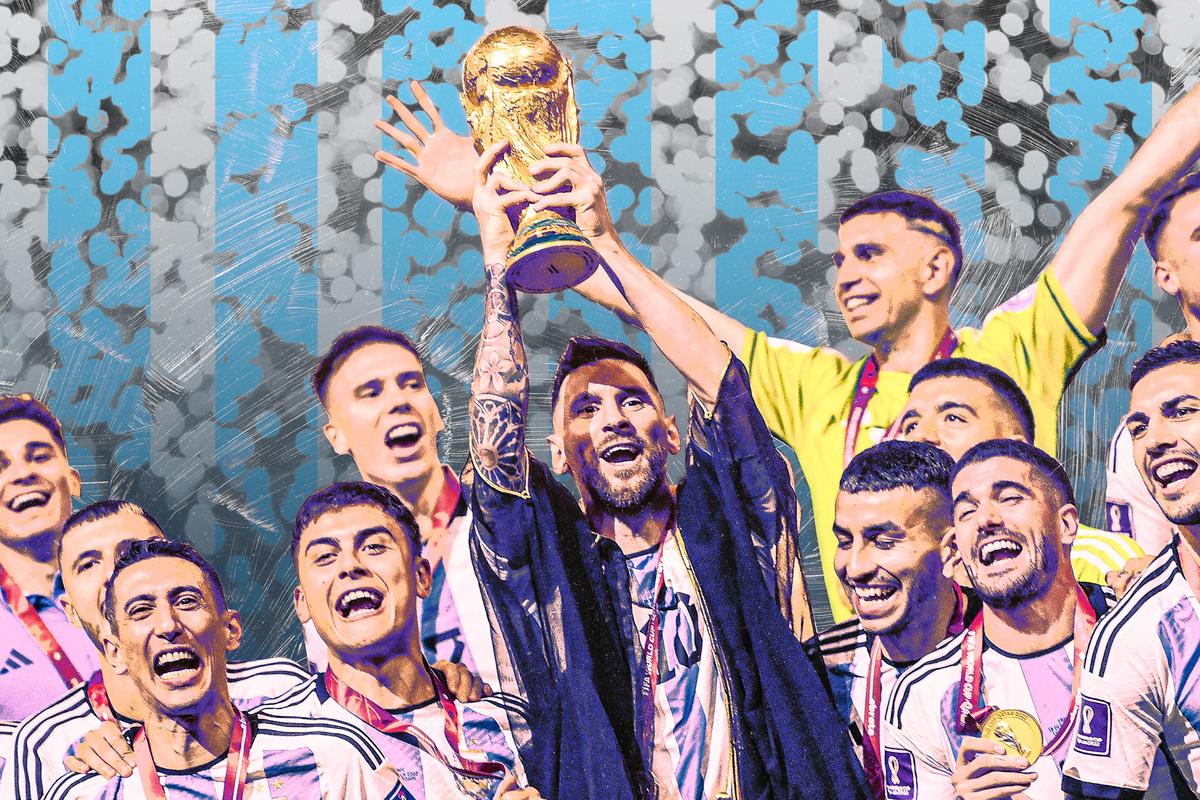
OK, I’m going to do my best here. But I need you to know exactly what you are getting, as Joan Didion once wrote, and what you are getting is a man who cannot feel his face. My hands are still shaking. There are tears in my eyes. I’m writing this less than 10 minutes after the end of the greatest World Cup final ever, which Lionel Messi’s Argentina won on penalties over Kylian Mbappé’s France, and I do not believe it is recency bias that makes me think that this match was the single most thrilling sporting event I have ever witnessed. Every game is a story. And when you consider the stakes, the performances, the history in the balance, the refusal of either side to lose, the moments of astonishing play, the sudden reversals and wild swings of momentum, the knife’s-edge uncertainty of the outcome, and the epochal significance of a result that brought the career of the world’s best player to an almost magically perfect climax, it is hard to imagine a story more overwhelming or more satisfying than this one.
There’s something so pure—I want to say so innocent—about a story like this. It’s a story that feels lifted from a children’s book, a story unblemished by the disappointments and compromises and hypocrisies inescapable in adult life. This is, in a way, the essence of sport’s appeal to us. It lets us escape, for a few hours at a time, into a better world.
What sort of better world? One in which the greatest Argentine player of all time (this morning I would’ve had to add “arguably”), after years of trying and failing to escape from the shadow of his predecessor Diego Maradona, opens the scoring by doing something Maradona never did: netting a goal in a World Cup final. One in which Ángel di María gives Argentina a second goal through a jaw-dropping counterattacking move that immediately looks like one of the best goals of the tournament. One in which France, after struggling all week with a virus that spread throughout the team, after getting run off the pitch for most of the first 75 minutes, comes roaring back to life thanks to Mbappé, the young heir apparent to Messi’s greatness and his club teammate at Paris Saint-Germain. One in which Mbappé’s 80th-minute penalty is followed just one minute later by another Mbappé goal, this one the equal of di María’s for beauty and ferocity, to force extra time just when Argentina seemed destined to win the match.
The aging king and the young challenger. The legendary battle outside the castle gates. In extra time, the story somehow became even more astonishing. Messi scored again, this time stabbing in a loose ball during a scramble in the area, only to see Mbappé score another penalty, this one in the 118th minute, to haul France back into contention just moments from defeat. In a match in which Messi broke the record to become the male player with the most World Cup appearances, Mbappé became just the second male player to score a hat trick in a World Cup final. Back and forth between the older star and the younger star, between the South American side and the European side, between the two best teams in the world.
Throughout the match, the camera kept cutting to the French president, Emmanuel Macron. At first he looked trim and professional, a politician making an official appearance; by the end of the game, he looked like he’d staggered out of a bar and into the chorus of a Tom Waits song. Macron was going through it.
I’ll tell you two true things about penalty shootouts: One, on paper, they are an unsatisfying and semi-random way to end a soccer match. Two, they are one of the most unbearably intense and exciting spectacles in sport. I could barely watch. Mbappé—who had snatched the Golden Boot (the award for the player with the most goals in the tournament) from Messi with his flurry of late goals—smashed his home for France. Messi, older and more cunning, checked his run before shooting, then gently rolled the ball into the net after seeing which way French goalkeeper Hugo Lloris would dive. It was probably the last kick of Messi’s World Cup career, and it saw him equal Mbappé and bring Argentina level in the shootout.
Two more Argentine penalties, both successful. Two more French penalties, neither successful. Emiliano Martínez, Argentina’s flamboyant goalkeeper, blocked Kingsley Coman’s shot before Aurélien Tchouaméni—just 22 years old and one of France’s standout players in the tournament—sent his flying wide of the post. Randal Kolo Muani converted a must-score penalty for France, and then, with the outcome of the tournament at his feet, Gonzalo Montiel scored for Argentina.
In doing so, Montiel rewrote soccer history. Before his kick, no South American team had won the World Cup since Brazil in 2002. Before his kick, neither of the leading greatest-of-all-time candidates, Messi and Cristiano Ronaldo, had ever won a World Cup; both had been hounded for years by speculation about what that failure would mean for their careers. After Montiel’s kick, one of those two players will never be hounded by any speculation regarding a missing piece of his legacy ever again.
Argentina lost its first match of this tournament, to Saudi Arabia, in what many people saw as a humiliating result. But what everyone knows about stories is that they’re not defined by their beginnings. Stories are defined by their endings, and after that first loss, the Albiceleste played with a raw edge of emotion whose equivalent I can’t remember seeing at a World Cup before. They weren’t the most talented or experienced team in the tournament, but they were the team that seemed to embrace the pressure of the moment with the most ferocious zeal. They won penalty shootouts in two of their last three matches, and when they taunted the Dutch after the first of those contests, it didn’t seem boorish or unsportsmanlike so much as it seemed like an earnest expression of competitive commitment: We are here to win, and we’re holding nothing back.
Maybe it was that undisguised emotion that made this story feel so childlike. I’ve been writing about Lionel Messi, in one form or another, since he was 20 years old and practically a child. I’ve been writing about Kylian Mbappé since he was even younger than that. Watching them today, with Messi at 35 and Mbappé at 23, I found myself thinking about what it means to grow up, what it means to confront all those compromises and disappointments from which soccer gives us a temporary escape.
Look at Messi now. He’s no longer the wide-eyed elf who danced through defenses for Barcelona. He carries some marks of time on him. Not many—not after his singularly blessed and idolized life—but some. You can see in his eyes that he’s taken some knocks, that he’s aware of the possibility of failure, that he knows life is not always going to give him exactly what he wants. He looks at the ball, before running up to take a penalty, not with blithe confidence but with a sort of chastened determination. Everyone, even Leo Messi, has to learn that reality doesn’t revolve around him all the time.
Mbappé, by contrast, looks utterly convinced of his own destiny. He looks certain, the way a child is certain, that he is the hero of the story. He glares fearlessly at every challenge, because being young is like holding a magic feather; it means believing that you are the chosen child of the universe, and if you do your best, you will inevitably be rewarded with a win.
We tell ourselves stories in order to live. I don’t know if growing up means learning to see reality through the story you tell yourself about it. But if it does, then it seems to me that this World Cup, and especially this final, held up a mirror to show us precisely how grown-up we are. Because the story felt so innocent, and just beneath the story, the reality was so grim. On the pitch, this was the best World Cup I’ve ever seen; it was also a tournament that was conceived as a sportswashing exercise, obtained through corruption, constructed with no regard for human life, and staged with contempt for anyone who spoke up for human rights. The childlike way to regard this competition was to delight in the stories it generated; the grown-up way was to mourn the fact that many, many people are dead now who would not be dead if this tournament hadn’t happened.
I think most of us tried to do both. I tried to do both. But the better the stories became, the harder it was to stay conscious of the terrible cost that someone—always other people; never us—paid to help create them. I don’t think Lionel Messi lifting the World Cup is worth a single human life. I still cried for joy when he lifted it. He lifted it after putting on an Arab ceremonial robe, and as he held up the trophy, it was hard not to think (even through joyful tears) that Qatar was claiming him as its asset, displaying him as a sort of brand icon. Qatar pays his salary, after all. Qatar pays Mbappé’s salary, too, because Qatar owns PSG.
And so the moral labyrinth of modern soccer keeps spreading over everything, luring you deeper with the promise of joy until you round the corner and collide with a dead end of money or propaganda or abuse. It would seem that there is no escape from our beautiful escape. My eyes haven’t dried yet. I still feel physically elated from that match. I know I’ll remember it for the rest of my life. What a story! And how often does life give you two hours that feel as magical as a children’s book? I need that feeling. I think we all need that feeling. I only wish we could feel it without having to remind ourselves that sometimes innocence is the least innocent thing that there is.

